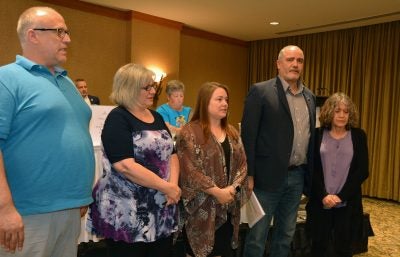 BURNABY – The K-12 Presidents Council met May 1 – 3 in Burnaby. CUPE BC President Paul Faoro and Secretary Treasurer Trevor Davies attended. Faoro brought greetings from CUPE BC and announced that the Premier’s Awards for Excellence in Education will, for the first time, have a category for “Outstanding Support.”
BURNABY – The K-12 Presidents Council met May 1 – 3 in Burnaby. CUPE BC President Paul Faoro and Secretary Treasurer Trevor Davies attended. Faoro brought greetings from CUPE BC and announced that the Premier’s Awards for Excellence in Education will, for the first time, have a category for “Outstanding Support.”
This category is open to support staff currently working in B.C.’s K–12 public school system (i.e. bus drivers, crossing guards, student supervisors, educational assistants, aboriginal support workers, custodians, maintenance, and clerical). The Premier’s Award is an opportunity for government to recognize “the enormous contribution of education professionals who go above and beyond to make life better for students in B.C.”
Nominate your favourite CUPE K-12 member in the category of Outstanding Support on the BC Government web site at: https://www2.gov.bc.ca/gov/content/education-training/k-12/teach/excellence-in-education#process
Nominations opened on April 23 and close on June 18. You can download a poster here.
Regular business of the council convened. K-12 Presidents received reports including the Secretary Treasurer’s Financial Report, Admin Committee, Support Staff Education and Adjustment Committee (SSEAC), Skills Enhancement, Job Evaluation and Public Employee Benefits Trust (PEBT). The Violence in the Workplace committee continues their work.
Regional reports updated members on what is happening in the regions and where regions were at in preparation for bargaining. Following a presentation on details of a cost share to raise the profile of education support workers, additional funds were approved.
CUPE Researcher Liz Blackwood reviewed preliminary bargaining survey results. K-12 Coordinators Tracey Mathieson and Rob Hewitt facilitated a discussion on proposals. K-12 Presidents Council members approved final proposals.
The group approved their draft bylaws which will now be forwarded to National for approval.
Under the current bylaws and in following the National Constitution, the Council elected their New Executive Officers: President – Warren Williams (CUPE 15); Vice President – Nicole Edmondson (CUPE 3500), Recording Secretary – Karen Wong (CUPE 3742), Secretary-Treasurer Leslie Franklin (CUPE 703), and Membership Officer – Dean Coates (CUPE 441). The membership officer will act as Sergeant at Arms, a new table officer position approved by members of the Council.
“The Council meetings were focused on bargaining – reviewing our members’ surveys, putting together our provincial proposals and our strategic planning session,” said incoming President Warren Williams. “I’d like to thank to former Chair Marcel Marsolais, Vice Chair Rod Isaac and Recording Secretary Maureen Hummel for their hard work and dedication to this Council.
“I also want to congratulate Nicole Edmondson, Leslie Franklin, Karen Wong and Dean Coates – I look forward to working together with them for the benefit of K-12 members.”
On the last day, presidents participated in a workshop on Strategic Planning.
Visit the CUPE BC gallery to view photos.
